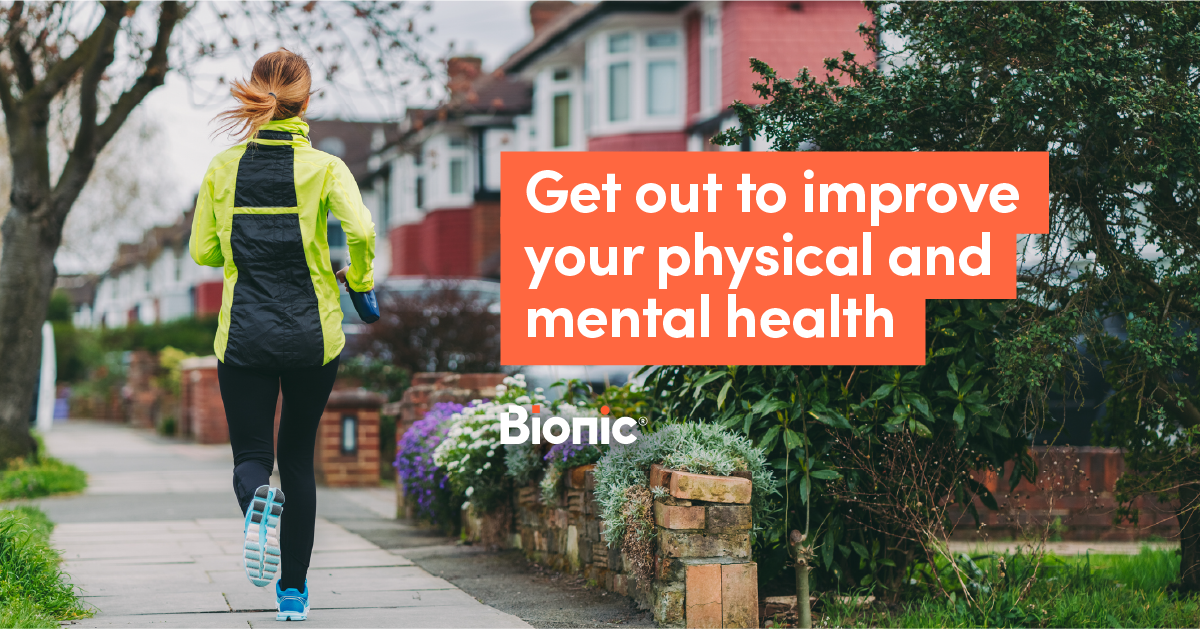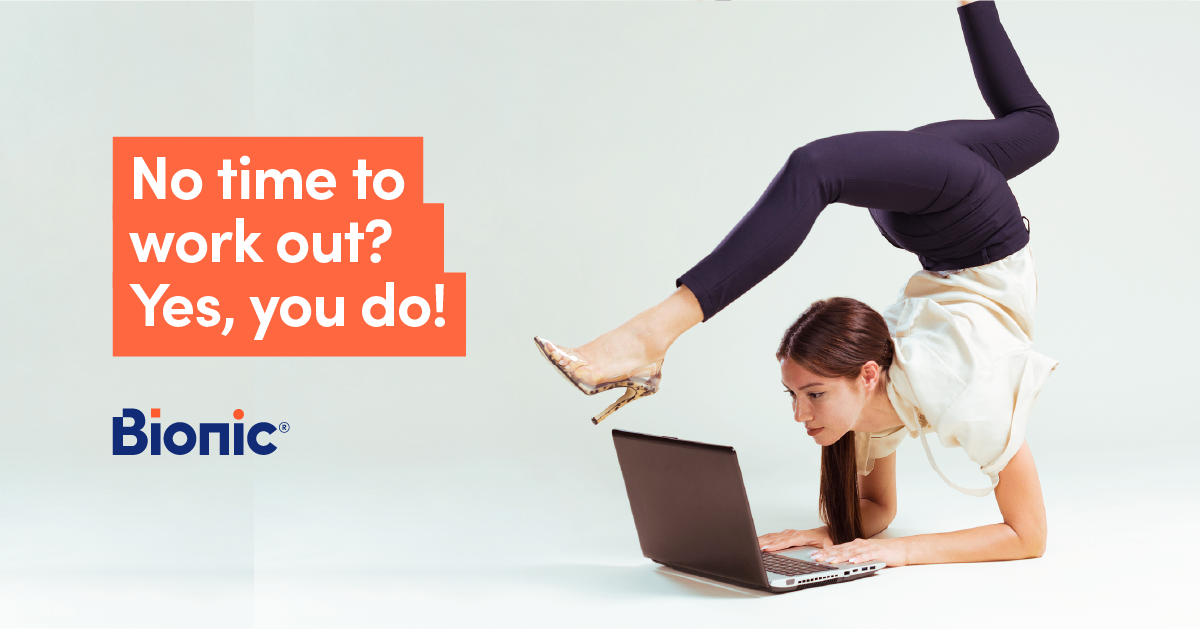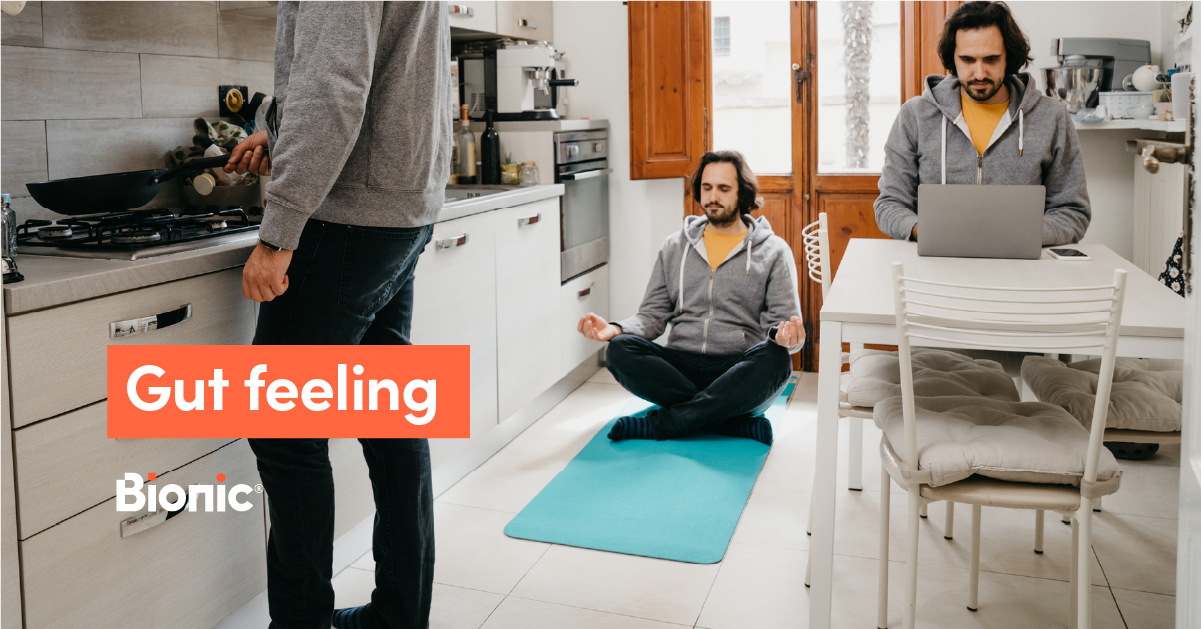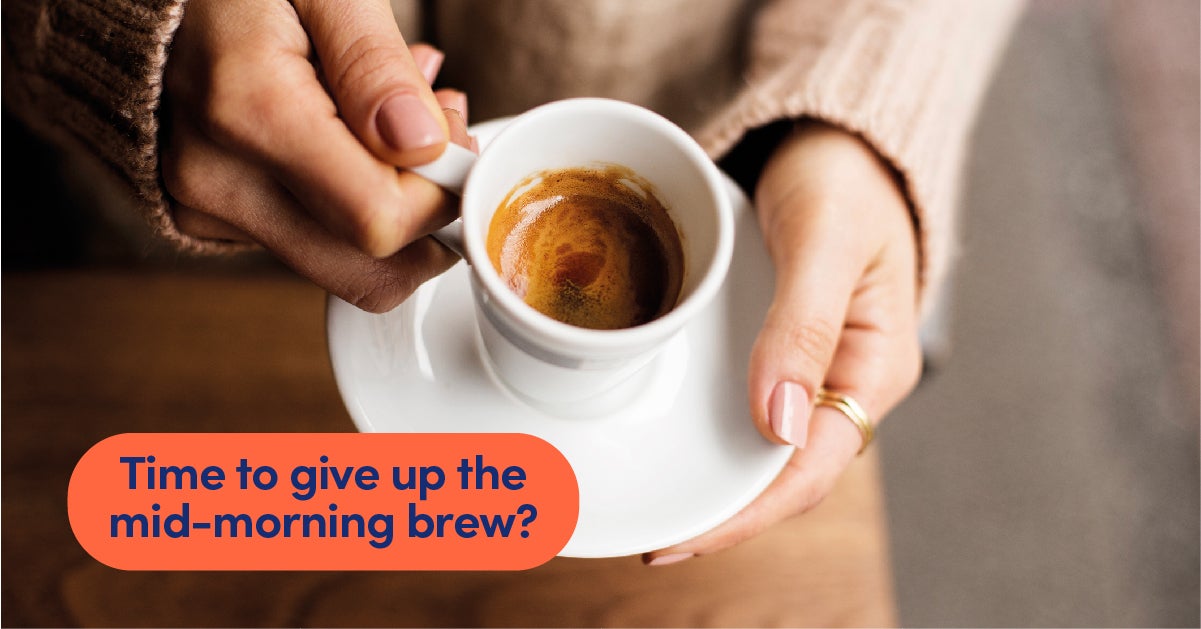Health and wellbeing tips for small business owners
Running a small business can take its toll on your health and wellbeing. But there are simple steps you can take to improve your physical and mental health.
Bionic caught up with Drew Campbell-Griffiths, an expert in nutrition, fitness and MMA, to get some wellness tips to cleanse your mind and body. Here are some quick tips that we can all use to help improve our health and wellbeing.

1. Get out to improve your physical and mental health 🌳
We all know by now, that exercise is great for our mental and physical health. But did you know the benefits of exercise are significantly increased when we replace the indoor setting of a gym or studio with an outdoor 'green' setting, such as woodland?
While a 30 minute HIIT workout in the gym will blow away the cobwebs, research has shown that carrying out the same exercise outdoors results in higher levels of self-esteem and reduces anxiety, compared to doing the exercise indoors.
This effect is especially pronounced if the exercise is done near an area of water such as the sea or by a river.
In Japan, spending time in a rural setting is now prescribed by doctors and they promote an activity known as "forest bathing" or “shinrin-yoku”. This activity consists of walking through a forest, with all of your senses open - taking in the natural sounds, smells, sights and sensations.
If you are unable to exercise outdoors, placing pictures of woodland settings in front of exercise machines, has been shown to have a similar effect!

2. Eat chocolate to help combat stress 🍫
If you are feeling burnt out, it could be worth your while looking into and trying out adaptogenic herbs (remembering to only ever do so after advice from a doctor or dietician).
Adaptogenic herbs have been used in traditional medicine for thousands of years, and are now backed by an increasing number of peer-reviewed studies.
Rhodiola Rosea is one of the most popular adaptogens, and it’s been used for centuries by people in Russia and Scandinavian countries to treat anxiety, fatigue and depression. It can also improve brain function and help with exercise performance.
Ashwagandha is another popular adaptogen, and that too has been shown to reduce fatigue and optimised levels of stress hormones including cortisol.
If herbs and supplements aren't your thing, then choosing foods high in magnesium can also help to combat stress and tension. Dark chocolate, nuts and avocados are all great sources. Just don't overdo it.

3. Learn how to breathe properly 😤
To breathe correctly and efficiently, people need to breathe primarily from the diaphragm, with the stomach rising and moving outwards as we breathe in, and becoming concave and flattening as we breathe out.
Unfortunately, if your work involves sitting down for long periods each day, the body will usually adapt by recruiting muscles in the chest to breathe instead.
This causes inhales and exhales to become shorter in duration and less efficient, which in turn can lead to higher levels of stress hormones.
To train your body to breathe with your diaphragm correctly, you can practise diaphragmatic breathing, also known as belly breathing. Here’s how…
- Sit or lie down, place one hand on your chest, and one hand on your belly.
- Breathe in through your nose slowly and visualise the air coming into your nose and into your stomach.
- The inhale should take between three and five seconds.
- Next breathe out through the mouth, as your belly moves inwards.
- The exhale should take between four and seven seconds.
This can be repeated each day for around five minutes. Focusing your mind on your belly rising and falling can also work well as part of meditation practice.

4. Try four-minute workouts 💪
Many people complain that they don't have enough time to complete a workout - sometimes there really aren’t enough hours in the day.
But what if we told you that you don’t need even an hour in the day to do an effective workout?
You don’t even need half an hour.
If you can spare just five minutes a day, you have enough time to be able to improve your fitness, wellbeing and health through an intense workout known as Tabata intervals.
Created by and named after Japanese scientist - Dr Izumi Tabata - one Tabata interval takes four (FOUR!) minutes to complete and consists of just three (THREE!) minutes of actual exercise.
- Here’s how it works:
- Exercise at 100% for 20 seconds
- Rest for 10 seconds
- Repeat this process eight times for a total of four minutes.
That’s it. You can use virtually any exercise - cycling, running, bodyweight squats while completing an interval.
Athletes use Tabata intervals to increase their "anaerobic performance", while sedentary workers (like you sat reading this. And me writing it, for that matter) can use them to improve markers of wellbeing, including insulin sensitivity.
A BBC documentary by Dr Michael Mosley investigated the benefits of Tabata intervals when using a bike - after four weeks and a grand total of 12 minutes of actual exercise (he did one interval per week) - his insulin sensitivity improved by a remarkable 24% - all this without getting a sweat on!
But one thing to keep in mind with this type of training is that a gentle one-minute warm-up is recommended, especially if you are doing higher impact and explosive exercises such as burpees or sprints. And there are your five minutes.

5. Trust your gut feeling 🎈
You might not realise it, but the health of your digestive system is directly related to your physical and mental health.
The flora in your gut, known as the gut microbiome consists of over 1,000 species of bacteria, each of which has a specific role to play in the body. And this has a direct impact on the immune system and the brain, influencing brain function and behaviour.
Studies have shown that the gut microbiota has a role to play in the regulation of anxiety, mood, cognition and pain.
Here’s how to look after your gut health and, in turn, your mental health.
Consuming two to three servings of fermented foods each day decreases levels of inflammation in the body, which in turn has been shown to improve mood and help alleviate symptoms of stress, depression and fatigue.
Fermented foods include kimchi, sauerkraut, miso, tempeh and kefir. As you might expect from anything that’s been fermented, some can be a bit of an acquired taste.

6. Consider giving up the mid-morning brew ☕
If you love a strong cup of coffee in the morning, did you know that a quarter of that caffeine will still be having an effect on your body 12 hours later?
That means having a mid-morning brew could stop you from getting a good night’s sleep. Here’s why it could be time to give up (or at least cut down) the caffeine.
How does caffeine keep you alert?
There’s a chemical in our bodies called adenosine - a central nervous system neuromodulator that tells our brain when we’re tired. Adenosine levels rise over the course of the day, and this makes us feel tired and drowsy.
To a nerve cell, caffeine looks like adenosine. Caffeine binds to the adenosine receptor and blocks off all the other receptors that adenosine would normally bind to.
Hey, presto! No more tiredness.
But (there’s always a but) all the while the adenosine is still knocking about in your bloodstream and building up during the day. This means that once your liver has metabolised the caffeine, you get one big hit of sleep-inducing adenosine - and that’s when you crash.
Which means you’ll want another cuppa.
Is caffeine bad for you?
No. Caffeine isn’t bad for you, and the tea and coffee you drink you get your hit actually contain antioxidants that are really good for you and can cut your chances of getting certain kinds of cancer, cardiovascular disease, and even dementia.
The only real downside to caffeine is that it seems to affect slow-wave sleep. This is the really deep sleep that’s needed for brain hygiene - the bit that makes sense of the day you’ve just had.
This kind of sleep diminishes if you have caffeine in your system overnight, which can see you feeling sluggish and less alert the next day.
Which means you’ll want another cuppa. And so the cycle begins again.
As with most things, there are pros and cons to getting your caffeine hit, and the positives probably outweigh the negatives when it comes to drinking tea and coffee.
But while there’s no need to completely give up that morning brew, there’s definitely a case for reaching for the caffeine-free options after mid-morning.
How Bionic can help take away some of your stress
Running a business can be stressful enough without having to worry about whether you're paying too much for your business gas and electricity, or if your business broadband is up to speed.
That's why it makes sense to let Bionic's tech-enabled experts look after your business essentials for you.
Part of our mission statement at Bionic is to make it radically easier to run a small business. One of the ways in which we aim to do this is to help take away the time and effort involved in sorting your business essentials.
We do this by helping you get your business essentials boxed off, quickly and thoroughly. Products like business energy, insurance, phone and broadband might not be front of mind but are a critical part of running your business.
Our service is free, so give us a call now on 0800 077 4181 to find out how we can help your business. Or you can leave your postcode in the pop-up box and we'll get back to you.
Do you have any health and wellbeing tips you swear by? Let us know on Bionic Twitter.
And for more health and wellbeing tips for business owners, sign up to The Backbone, our fortnightly small biz newsletter.




